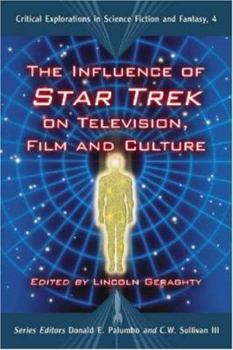The Influence of Star Trek on Television, Film and Culture
(Book #4 in the Critical Explorations in Science Fiction and Fantasy Series)
Select Format
Select Condition 
Book Overview
When the first season of Star Trek opened to American television viewers in 1966, the thematically insightful sci-fi story line presented audiences with the exciting vision of a bold voyage into the final frontiers of space and strange, new galactic worlds. Perpetuating this enchanting vision, the story has become one of the longest running and most multifaceted franchises in television history. Moreover, it has presented an inspiring message for the future, addressing everything from social, political, philosophical, and ethical issues to progressive and humanist representations of race, gender, and class.
This book contends that Star Trek is not just a set of television series, but has become a pervasive part of the identity of the millions of people who watch, read and consume the films, television episodes, network specials, novelizations, and fan stories. Examining Star Trek from various critical angles, the essays in this collection provide vital new insights into the myriad ways that the franchise has affected the culture it represents, the people who watch the series, and the industry that created it.





